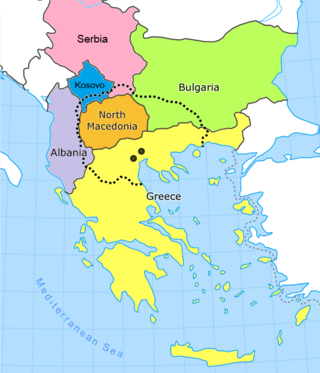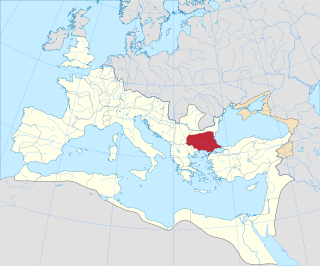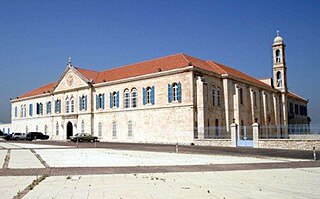Constantine most often refers to:

In church governance, a diocese or bishopric is the ecclesiastical district under the jurisdiction of a bishop.

An exarch was the holder of any of various historical offices, some of them being political or military and others being ecclesiastical.

Rumelia was the name of a historical region in Southeastern Europe that was administered by the Ottoman Empire, corresponding to the Balkans. In its wider sense, it was used to refer to all Ottoman possessions and vassals in Europe. With the exception of Ottoman Hungary, these would later be geopolitically classified as "the Balkans". During the period of its existence, it was more often known in English as Turkey in Europe.

The Megali Idea is a nationalist and irredentist concept that expresses the goal of reviving the Byzantine Empire, by establishing a Greek state, which would include the large Greek populations that were still under Ottoman rule after the end of the Greek War of Independence (1821–1829) and all the regions that had large Greek populations.
Eparchy is an ecclesiastical unit in Eastern Christianity that is equivalent to a diocese in Western Christianity. An eparchy is governed by an eparch, who is a bishop. Depending on the administrative structure of a specific Eastern Church, an eparchy can belong to an ecclesiastical province, but it can also be exempt. Each eparchy is divided into parishes, in the same manner as a diocese in Western Churches. Historical development of eparchies in various Eastern Churches was marked by local distinctions that can be observed in modern ecclesiastical practices of Eastern Orthodox Churches, Oriental Orthodox Churches and Eastern Catholic Churches.
There have been several Greco-Turkish Wars:

Pomorie, historically known as Anchialos, is a town and seaside resort in southeastern Bulgaria, located on a narrow rocky peninsula in Burgas Bay on the southern Bulgarian Black Sea Coast.

Macedonia most commonly refers to:

The Bulgarian Orthodox Church, legally the Patriarchate of Bulgaria, is an autocephalous Eastern Orthodox jurisdiction based in Bulgaria. It is the oldest Slavic Orthodox church, with some 6 million members in Bulgaria and between 1.5 and 2 million members in a number of other European countries, Asia, the Americas, Australia, and New Zealand. It was recognized as autocephalous in 1945 by the Ecumenical Patriarchate of Constantinople.
Greek Empire, the term depending on the era, can refer to the following Greek regimes:
Epirus is a historical and geographical region of the southwestern Balkans, straddling modern Greece and Albania.

The Byzantine Greeks were the Greek-speaking Eastern Romans throughout Late Antiquity and the Middle Ages. They were the main inhabitants of the lands of the Byzantine Empire, of Constantinople and Asia Minor, the Greek islands, Cyprus, and portions of the southern Balkans, and formed large minorities, or pluralities, in the coastal urban centres of the Levant and northern Egypt. Throughout their history, the Byzantine Greeks self-identified as Romans, but are referred to as "Byzantine Greeks" in modern historiography. Latin speakers identified them simply as Greeks or with the term Romaei.
Greek EastandLatin West are terms used to distinguish between the two parts of the Greco-Roman world and of medieval Christendom, specifically the eastern regions where Greek was the lingua franca and the western parts where Latin filled this role.

Yalova is a market-gardening town located in northwestern Turkey on the eastern coast of the Sea of Marmara. It is the seat of Yalova Province and Yalova District. Its population is 133,109 (2022). A largely modern town, it is best known for the spa resort at nearby Termal, a popular summer retreat for residents of Istanbul.

The Byzantine Empire, also referred to as the Eastern Roman Empire, was the continuation of the Roman Empire primarily in its eastern provinces during Late Antiquity and the Middle Ages, when its capital city was Constantinople. It survived the fall of the Western Roman Empire in the 5th century AD and continued to exist until the fall of Constantinople to the Ottoman Empire in 1453. During most of its existence, the empire remained the most powerful economic, cultural, and military force in the Mediterranean world. Its citizens continued to refer to their empire as the Roman Empire and to themselves as Romans—a term which Greeks continued to use for themselves into Ottoman times. Modern historians distinguish the Byzantine Empire from the earlier Roman Empire due to the imperial seat moving from Rome to Byzantium, the empire's integration of Christianity, and the predominance of Greek instead of Latin.

Thracia or Thrace is the ancient name given to the southeastern Balkan region, the land inhabited by the Thracians. Thrace was ruled by the Odrysian kingdom during the Classical and Hellenistic eras, and briefly by the Greek Diadochi ruler Lysimachus, but became a client state of the late Roman Republic and early Roman Empire as the Sapaean kingdom. Roman emperor Claudius annexed the kingdom as a Roman province in 46 AD.
Byzantium is an ancient Greek city, later renamed Constantinople and then Istanbul.
Subdivisions of the Byzantine Empire were administrative units of the Eastern Roman or Byzantine Empire (330–1453). The Empire had a developed administrative system, which can be divided into three major periods: the late Roman/early Byzantine, which was a continuation and evolution of the system begun by the emperors Diocletian and Constantine the Great, which gradually evolved into the middle Byzantine, where the theme system predominated alongside a restructured central bureaucracy, and the late Byzantine, where the structure was more varied and decentralized and where feudal elements appeared.

The Maronite Church is an Eastern Catholic sui iuris particular church in full communion with the pope and the worldwide Catholic Church, with self-governance under the Code of Canons of the Eastern Churches. The current head of the Maronite Church is Patriarch Bechara Boutros al-Rahi, who was elected in March 2011 following the resignation of Patriarch Nasrallah Boutros Sfeir. The current seat of the Maronite Patriarchate is in Bkerke, northeast of Beirut, Lebanon. Officially known as the Antiochene Syriac Maronite Church, it is part of Syriac Christianity by liturgy and heritage.











